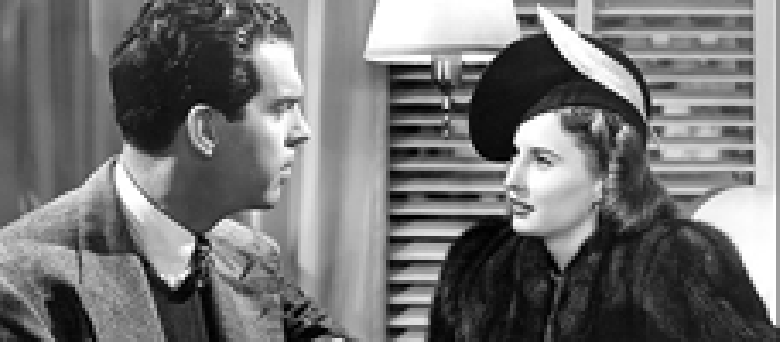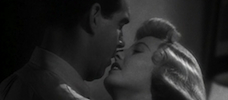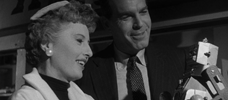Reviews
Mitchell Leisen
USA, 1940
Credits
Review by Brynn White
Posted on 13 April 2010
Source TCM recording
Categories A Criminal Couple
Boy meets girl in courtroom. Boy takes girl home for a Hoosier Christmas. Only trouble is the boy’s a government-employed attorney and she is his prosecutee. Suffice to say, it’s not your traditional meet-cute.
But it is, after all, a Preston Sturges-concocted scenario.
The court calls, “Anna Rose Malone, also sometimes known as Lee Landers…”
“Sometimes known as a lot of other things,” the assistant DA John Sargent underhandedly cracks, earning him a glare so piercing it could fry an egg. Thus inaugurates the onscreen rapport of Fred MacMurray and Barbara Stanwyck. The exposition of Remember the Night has already established MacMurray — a bachelor up-and-comer (with Hollywood’s illustrious symbol of success: an exorbitantly un-PC black man servant) unceremoniously recalled from Christmas vacation for one last conviction. Like him, the audience has barely glimpsed Stanwyck’s behatted lady thief. He is inclined to dismiss her just as the film introductorily frames her: a faceless, amoral sashay out of the jewelry store with an unpaid-for diamond bracelet in tow. It’s part of Sargent’s job to compartmentalize the bad eggs. His boss believes he’s “got the face” to convince a jury to forego the yuletide charity of reprieving a pretty young woman from a holiday jail stint; even the savvy defendant doesn’t smell foul play when he gets the trial delayed until the new year.
The head district attorney recognized in MacMurray, as did the industry, an innocuous charm: All-American handsomeness, a strong but not overwhelming build, a subtle twinkle to the eye and a nimbleness with the one-liner, he always hit the perfect midpoint between bland and smug. MacMurray privately fancied himself a saxophonist who just got lucky and this lack of conceit translated to an affable screen presence. Born to a musical family in small-town Illinois, MacMurray was raised to be a man and an artist in military academies and music conservatories before he lucked out in the movies, a dependable lead by the post-Code 1930s.
Much like her character in the film, Stanwyck got a decidedly different lot. Orphaned at a young age in Brooklyn, she was raised by her showgirl sister until she became one herself at age 15. Her Hollywood rise coincided more appropriately with the raw pioneering days of the talkie. As her character listens to MacMurray’s fond remembrances of his mother’s farm her wistful concession that “We never had anything that swell,” comes from the heart. The mama’s boy and the runaway discover they hail from the same place geographically, but their experiences have been worlds apart.
This collision almost wasn’t meant to be, as Carole Lombard was originally cast. Lombard had already appeared opposite MacMurray four times, twice under Remember the Night director Mitchell Leisen in the charming, loosely screwball Hands Across the Table (1935) and genre-skipping humdinger Swing High, Swing Low (1937). A Lombard take on amorality would have been too nihilistically zany (see of course My Man Godfrey, and True Confession, also with MacMurray), bereft of the self-aware introspection of Stanwyck. As Douglas Sirk observed, “She impressed me at the time as someone who had a great experience, someone who had been touched deeply by life in some way…” (This quality is on most piquant display in Fritz Lang’s Clash by Night, another evocation of the Return Home). Lombard was most luminous in her single-mindedness; her sensuality was embedded in an overarching élan vital. She often seemed to be blindly plunging into life.
Stanwyck’s eyes, however, were never closed; they were aptly characterized by James Harvey as “the eyes that miss nothing.” She was infinitely faceted and Remember the Night offered a rich smorgasbord of the Stanwyck stock-in-trade: leggy, fur-clad bombshell; woebegone victim of a checkered past; lawless subversive; self-sacrificing nurturer; and crafty con artist. MacMurray’s right that she’s known by a lot of things, she’s known by all of them. The film’s potency hinges on Stanwyck’s ability to coalesce these virtues into a believable whole. Often times sex had been kept at a cool remove; from Baby Face through Double Indemnity, it was something plastic to be deftly manipulated at her will, never an impetus to something more substantial.
Much has been said of Remember the Night as a neglected Christmas gem (it is still widely unavailable on DVD), but less made of its sophisticated commentary on love and sex. Sturges agonized over the script, which he sardonically praised as having “quite a lot of schmaltz, a good dose of schmerz, and just enough schmutz to make it box office.” He disliked basing Sargent’s motivations in a crisis of conscience, do-gooder desire to reform, or pitying charity. He found solace in an underlying naughtiness: violation of the Mann Act. Sargent, in Lee’s later words, has a fever for her. In the midst of this Rockwellian Americana oasis are two people grappling with their intensifying yen for each other.
“One of these days one of you boys is going to start one of these things differently - and one of us girls is just gonna drop dead from surprise,” Lee taunts John when she finds herself dropped at his doorstep by the bondsman he’s hired to save her from the jailhouse turkey buffet. She’s sure he’s a playboy and that he likes her legs. He’s convinced such assumptions derive from “the mind of a sewer.” It’s only when she’s assured he doesn’t want her that she insists on staying. That, and she has nowhere else to go. The rules of the classic flirtation game, on which she fancies herself an expert, have changed. He’s moved to take her out on the town. She chastises his line of work, yet expresses surprise he seems so nice. He finds her chiseling way of life ‘cheesy.’ But as the context of their situations begin to crystallize, the intrigue only heightens. John inquires about her motivations with a schoolboy’s curiosity and a lawyer’s didactics. Perhaps this boy does do things a little differently…
Lee sketches a hypothetical situation of starving and degradation, entrapping John to admit that he’d steal a loaf of bread from a turned back. But her “everyone’s got his reasons” lesson is turned on its heels when she admits she would have gone across the street for a multiple course meal before feigning a forgotten purse. “Your way’s smarter.” “But you’re honest,” she retorts. The film wrestles between this honest vs. smart dichotomy. Which route is better? More admirable? Can a person purely be one or the other? Can one change? Should they? Does its roots lie in nature or nurture?
Lee and John take to their home state Indiana and in the process explore these questions. First they engage in the age-old gender clash of reading a map and driving in circles. When they are arrested for trespassing and suspicion of lewd behavior, after parking all-night on the farm of a prickly old-timer, they play pretend as Mary Smith “the bubble dancer” from Ohio and her companion Henry Longsworth Longfellow. The charade ends when John realizes their escape was orchestrated by Lee, who set fire to the sheriff’s trash can as a diversion. He is befuddled once again that her “mind works differently,” while she mildly resents that he’s treating her “like a sister.” The visit to Lee’s mother is a striking detour into the Southern Gothic, bathed in a noirish darkness that embodies the stagnancy of close-mindedness and the unwillingness to forgive. John doesn’t bat an eye when he rescues Lee from this dead end and in no time she’s being presented to John’s widowed mother, aunt, and their yodeling houseboy for a cozy agenda of homecooking, apple bobbing, church bazaars, barnyard dancing, and tree-side presents. John and Lee get to, in the paths of many screwball protagonists, recreate a childhood together; he bashfully flaunts the fruits of his adolescent piano lessons and she answers with the rediscovered skills of her dime store schilling. It becomes a recital of rediscovered youth. The past becomes as fluid as Lee’s ethical code.
This middle-America sanctuary derives from screenwriter Preston Sturges’ own unconventional background. His bohemian mother claimed to have not known she was pregnant until the contractions started. Her childhood pneumonia remedy was a spoonful of champagne every hour (it worked), and the home’s most visible outsider was the larger than life, near-mythological Isadora Duncan. Meanwhile, Sturges’ step-father (whom he believed to be his own) kept a Chicago homebase, where young Preston was shuffled to and from his mother’s European exploits until his parents’ split left him permanently in her care. But Sturges idolized his everyman father and his wall of sports trophies, dotingly recalling “I adored this ex-football player… this man who had brought home a present for me every night of my life when I was little, and whose unfailing tenderness and gentleness toward me extended back into the diffused twilight before memory began.” Sturges found fulfillment in this bipolar upbringing; he was a walking, talking two-sided coin of the unconventional and the traditional, the provincial and the urbane. The delicate fuse between these two realms was acceptance and affection; Sargent tells his mother that she taught him the difference between wrong and right but she corrects him: “it was love.”
Sargent’s spinster aunt can only see the handsome pair as romance novel soulmates, teaching Lee her secret to popovers (“the way to a man’s heart is through his gizzard”) and literally encasing her in her unused wedding gown of yore, corset and hoop skirt and all. His practical mother prescribes a case of blind lust, certain to spell doom for them both. When she appeals to Lee to preserve her besotted son’s accomplishments by letting him go she asks if she loves him. The scripted response was “I’m afraid so,” but Stanwyck, likely by her own volition, re-punctuates and delicately confesses “I’m afraid.” This delivery beautifully encapsulates the emotional whirlwind of her Indiana sojourn and the terror of the plunge into the unknown that love requires; the Sargent family’s warm embrace of forgiveness and acceptance has brought to the surface shame, remorse, confusion, and for the first lucid time — the motivation to change, to re-evaluate her modus operandi.
Sargent, on the other hand, throws caution to the wind. He takes a detour through Canada in the hopes of inciting Lee to take flight. As Sturges, ever the bemused cynic, states: “Love reformed her and corrupted him, which gave us the finely balanced moral that one man’s meat is another man’s poison.” Love’s paradox of regression-progression rears its devilish head, but it is also a great equalizer. He’s a “sucker” and she’s a “poor sap,” as if they’ve both reverted to a primordial ground zero of base emotions (which Sturges literalizes later in The Lady Eve’s inherent allusions to the Garden of Eden). Appropriately enough, they enjoy a proto-Honeymoon, the conclusion of their invented history together, in front of a studio-built Niagara Falls. Leisen keeps the lights dimmed low (a “diffused twilight,” if you will), to heighten the sensuality and let the actors’ tender, desperate voices do the work. Sargent will go the smart route and fix the trial, but honesty will prevail when Lee pleads guilty. As for the future of their romance, there is no resounding gavel. With many of its raised questions left unanswered, the painted picture is neither rosy nor dark, but the demonstration of what two people can be – and not be – to each other is richly hued.
Sturges and Billy Wilder had rather vocal vitriol for Mitchell Leisen, resigned to history as a glorified window-dresser to the stars (his background was in set design) and enemy numero uno of the Auteur State. But Leisen had an obvious touch for a dynamic interplay between his players. With Remember the Night he crafted such a fine performance from his leading lady it inspired Sturges to approach her with the vow “I’m going to write a great comedy for you,” (and it was, one of the greatest, The Lady Eve). Together he and Sturges laid the groundwork for one of the most volatile erotic charges in cinema history (Double Indemnity), one so strong that sixteen years later in There’s Always Tomorrow, Stanwyck could show up on MacMurray’s door still carrying a torch for her old sweetheart, but so nuanced, that she could believably walk away.
More A Criminal Couple
We don’t do comments anymore, but you may contact us here or find us on Twitter or Facebook.







